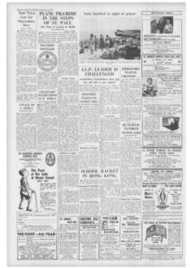Page 5, 12th July 1963
Page 5

Report an error
Noticed an error on this page?If you've noticed an error in this article please click here to report it.
Tags
Share
Related articles
The Donovan Report —a Modest Act Of Faith In The Worker
Slackers Take The Benefit
Boon To Men On Leave
Rrr - R - Rr - Rt
Why Catholic Workers Can Feel Abandoned
INDUSTRIAL ROUND-UP by Hugh Kay
PICKING WORKERS' BRAINS
TALK about giving workers a share in management, and someone is sure to reply that the workers don't know enough. or are too interested in the price of the canteen tea to give their mind to broader issues.
But experiments tried by one or two of the larger firms in Productivity Year have revealed that the ideas of the man on the shop floor—who after all is closer than anyone to the details of the job—can save very large sums of money.
For instance, by the end of March, four months or so after Productivity Year opened, the Joseph Lucas organisation received 30,000 suggestions from its 50,000 employees. It is now considered that a third of these ideas will be directly useful, and a number of workers have received payments of several hundred pounds each for their suggestions. The maximum award is LEM.
If suggestions continue to flow in at the present rate, it is reckoned that the company will pay out awards totalling more than £200,000.
In the company's sales and service office, staff undertook to save 1.000.000 sheets of paper during the year. Another example comes from the Shaftmore Lane Lamp Factory, where the proportion of rejects coming off the assembly line has fallen from six per cent to 0.6 per cent since the productivity year began.
After all. in mass production industry. an employee who decides that a screw hole is unnecessary can save as many as 25t),000 screws a year. and a man who suggests that wire should go round a terminal two and a half times instead of three can possibly save miles of wire.
The advantages of this type of co-operation go beyond saving money. Employees accustomed to thinking in terms of change will not oppose change for its own sake. The man who suggests the introduction of. say, a fork-lift truck will not resent the truck when it arrives.
Best of all, the new spirit thus engendered helps workers to feel that they are an important part of a lively organisation. and that it pays to "use your loaf".
Refusal to close
OTHER signs of the times appear from the way in which workers are tending to take a hand themselves to stop firms from having to close down. Two thousand workers at the Ford motor car plant at Doncaster. which is due to close shortly. are offering to pool their "pay off" money and give it to any employer willing to keep the factory going.
The pool would probably yield £150,000, which could either be offered as a loan or used to buy shares in the company. The outstanding feature of this idea is the workers' pride in themselves as a first-class team of men who really know their job and shrink from the idea of breaking up what they themselves describe as a "valuable human asset".
In another case. new methods,
I and a team effort by management, workers and unions, have saved a small shipyard from closure and kept 120 men in jobs. This figure will soon rise to 150, and there is a full order book for 12 months.
In 1959. only 60 men were employed by the Rowhedge Ironworks yard near Colchester, and a Receiver-Manager was appointed to sec if the business could he revived. A break came with an order from Pakistan for a 850-ton oil tanker on condition that the delivery date was kept.
The yard was not big enough for the job, but management and workers met to discuss methods of construction. Large-scale reorganisation followed, and it has worked. The management unreservedly gives credit for the survival to the unions, the United Society of Boilermakers, Ship Builders and Structural Workers. and the Shipwrights Association (now amalgamated) White collars TODAY, nine trade union officers out of 10 left school at the age of 14 or 15, but they are the sort of person who would have gone on to university had there been a 1944 Education Act in force at the time. When they retire. who is going to replace them? The cream of good leadership material is now certain of receiving higher education, and. because of the limited attractions, does not think in terms of trade unionism as a career.
The answer suggested by a recent PEP critique of the trade unions is that. in the first place, the unions must spend much more of their money on educating their own members. who must study trade union law and practice, economic problems, planning and wage regulations. and technical innovations. This will call for higher union subscriptions.
Secondly. the unions should make an all-out effort to increase fringe benefits which will attract white collar workers and make mobility easier. At present, sick benefit is paid by only a half of industry, which lags far behind our government departments, whether national or local. Over 40 per cent of the working force in this country is employed by local or national authorities, and all of these have extremely good sick schemes.
While on statistics, by the way. did von know that because of automation nearly 40 per cent of the country's work force now comes under the heading of white collar workers? There are 8.000,000 of them altogether, of whom 1.250,000 are members of unions affiliated to the TUC. Another 6511.000 belong to non-affiliated unions.
A worrying factor is that while. in the nine declining industrial regions. you find something like 80 per cent of the working population in the trade unions. the figures for the 13 expanding regions are far lower. Only in nine of them does the trade union membership approach 60 per cent, and in four of them it is under a quarter.
We simply must stop thinking of the union as a defensive organism only, with no viable function in times of prosperity.
Communist strength
PR the benefit of those who hink we ought to stop talking about opposing the Communists,
may I point out that. in the London area of the A.E.U., the Communists virtually control every full-time official position. The same is very nearly true of a number of other unions in the London area. Yet the London membership of the Communist Party is less than 10,000.
In the AEU as a whole, 42 out of 150 full-time posts are held by candidates with Communist Party support. Yet the whole union probably contains no more than 5,000 Cornmunists out of a total membership of a million.
Meanwhile, the British Communist Party is still uncertain about the dispute between China and Russia over the interpretation of the Marxist scriptures. Watch out for a week-long discussion and debate on Marxism now being organised by the Party for the month of November.
Speakers will include Professor Bernal, and Messrs. Dobb, Halsey. Aaronovitch, Cornforth, Hobshewn, Bellamy. Bush and Kettle. Canon Collins has been invited in for the discussion on the roots of war and the conditions of peace.
blog comments powered by Disqus











